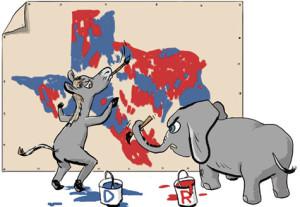
In response to the Nation’s question:
“It’s clear that the political system in the US isn’t working for many. If you had to pick one root cause underlying our broken politics, what would it be and why?”
The Nation has asked a question that necessitates a serious, and well thought out response to what could be the single leading cause to America’s broken political system. Many can claim it’s the culture of our politics in the era of international terrorism. Others could say it’s the changing demographics of the U.S. which have placed immense social strain on the system. Still others would argue that the impact of money, along with the Citizens United ruling have contributed significantly to the degradation of the U.S. political system. While these and more most certainly contribute to the problems that plague Washington, there is a specific underlying aspect to the United States which prevents these issues from being resolved in a more democratically responsive manner: our constitution and its tendency to promote stalemates.
Is Something Wrong with America?
The way our constitution was structured was by no means meant to be fully democratic or to produce a broad consensus among political factions. Its original design as a ‘republic’ was put in place by the Framers who were apprehensive of a tyranny of the majority.
In doing so, the mechanisms which resulted, most specifically the checks and balances between the lower and upper chambers of Congress, have thwarted the democratic aspirations of an entire nation, and, in turn, have prevented the type of constructive dialogue necessary to put American politics back on a stable track. It’s here where America’s most important issues find their final resting place.
The Senate has served as a graveyard for democratic aspirations since the defeat of the League of Nations, and has only continued doing so after the implementation of the extra-constitutional filibuster, helping to lend a hand in the demise of civil rights legislation for generations. Inequality among what are otherwise considered equal citizens plays out in full force as the Senate has been designed to be comprised of 100 Senators with 2 Senators, leaving those states with larger populations to be held at the mercy of a select few smaller states.
How is it that the vote of a person in Wyoming can be valued almost 70 times more than that of a person in California? This malapportionment in population size and representation has allowed for a small minority of the country, about 7.28% to be exact, to be represented by 34 Senators, which is just enough to block any constitutional amendment. This leaves roughly 93% of the U.S. population to be represented by the remaining 66 Senators.
When looking at these startling statistics, it should be clear what the issue is; who really should be the ones being represented? The people who reside in those states, or the purely symbolic entity of a ‘state’? As Alexander Hamilton addressed the delegates at the constitutional convention, he reminded them that providing equal status to states in the Senate was “preposterous” and “absurd”. He added that “The truth is…” it was “a contest for power not for liberty”.
 Today this assertion couldn’t be any more relevant. Smaller states continually impede reforms that would advantage larger states over their own interests. As New York Times columnist Adam Liptak stated in “Smaller States Find Outsize Clout Growing in Senate”, “In one of every 10 especially consequential votes in the Senate over the two decades ending in 2010, as chosen by Congressional Quarterly, the winning side would have lost had voting been allocated by population…”
Today this assertion couldn’t be any more relevant. Smaller states continually impede reforms that would advantage larger states over their own interests. As New York Times columnist Adam Liptak stated in “Smaller States Find Outsize Clout Growing in Senate”, “In one of every 10 especially consequential votes in the Senate over the two decades ending in 2010, as chosen by Congressional Quarterly, the winning side would have lost had voting been allocated by population…”
Despite the obvious problem which is a lack of political equality among what are otherwise considered equal citizens, the reconstruction of our constitution to meet a more democratic standard is continuously impeded by those same Senators from the smaller states who want to maintain their grip on power over the legislature.When you add the unequal representation in the Electoral College, the inability for democracy to operate only worsens.
Since each state is quote ‘entitled to a number of electors equal to the whole of Senators and Representatives’, those states with tiny populations but are ‘entitled’ to two Senators receive a heavier count of their vote in the Electoral College. The Electoral College has allowed a select few States along with a minority of the population to decide who is the President of the Union.This poses a serious problem if we are to mend the politics of our nation. Our system was designed by figures who did not believe in the fullest extent of democracy- understandable, seeing that 1776 was not the heyday of democratic rights for most people around the world; but that does not mean we should abide by those same standards. Americans should take into consideration the lessons learned from other nations who have dealt with the same sort of political inequality. In the end, a country whose democratic foundations were built from sand will eventually erode away with the winds of change.
Take Action: Tell Congress to Honor John Lewis with a New Voting Rights Act

Leave a Reply